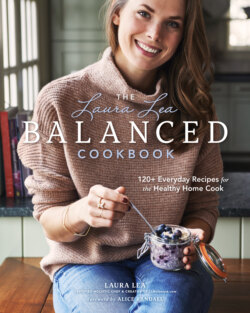Читать книгу The Laura Lea Balanced Cookbook - Laura Lea - Страница 26
На сайте Литреса книга снята с продажи.
Оглавлениеand I use them in appropriate balance with
everything else in any given dish. The
LL Balanced way of eating will promote
hormonal regulation and a healthy, energized
body. Unless you have specific instructions
from your doctor, I’d suggest you don’t even
look at calorie counts or grams of fat. Eat well,
eat slowly, and eat without distractions, and
your body will do the rest of the work.
Plant-sourced fats: Healthy sources of
monounsaturated fats include avocados, nuts
and seeds, olive oil, and toasted sesame oil.
Another healthy plant-based fat is coconut oil.
Coconut oil is a saturated fat (if a fat is solid
at room temperature, it is saturated), and
next I explain why that shouldn’t scare you.
However, coconut fat is unique in several ways.
First, it contains a form of fat called medium-
chain-triglycerides, or MCTs, which the body
uses immediately for energy instead of being
stored. Second, coconut also contains lauric
acid, a fat that has potent antibacterial and
antimicrobial properties. For these reasons,
coconut oil is a great addition to a healthy
diet. I purchase only extra-virgin organic
coconut oil, which has a coconut-y taste, so I
use it in recipes that fit this flavor profile.
Animal-sourced fats: Animal fats are saturated,
and the term saturated fat can have negative
connotations; but not all saturated fat is created
equal. Moderate consumption of saturated fat
from high-quality sources, such as pasture-
raised animals, 100% grass-fed butter, and
coconut, can be beneficial. These sources have
anti-inflammatory omega-3 fatty acids and
can improve nerve, brain, liver, heart, and
lung health. You also don’t need to be afraid
that these saturated fats will have a negative
impact on your cholesterol. In fact, our bodies
require cholesterol to function properly. Our
bodies actually make cholesterol on their own,
but they can benefit from a moderate amount
of additional cholesterol from high-quality
saturated fats. Saturated fats are also incredibly
stable, so they won’t oxidize and become rancid
in high-heat cooking the way vegetable oils do.
True to form, I keep it simple and primarily use
grass-fed butter as my choice animal fat. The
brand Kerrygold is available at a fantastic price
at Trader Joe’s. Other fats, such as lard, tallow,
schmalz, and ghee can be great options, again
when sourced from pastured animals, so feel
free to play around with these. Ghee is clarified
butter, meaning that the milk solids have been
separated and removed, so this can be a good
option for people who do not tolerate dairy well.
Eliminate or minimize as much as possible:
• Trans fats that come from hydrogenated,
refined vegetable oils. Some examples
are safflower, corn, canola, cottonseed,
and soybean oils. These unstable, easily
rancid-ized fats are high in inflammatory
omega-6. In addition, they tend to increase
the “bad” LDL cholesterol and lower the
“good” HDL cholesterol. If you stick to
my guidelines for an LL Balanced way of
eating, you should rarely come across trans,
hydrogenated, or partially hydrogenated
fats. They are typically found in packaged
snack foods, fried foods, margarine, and
frozen supermarket baked goods. “What
about canola oil?” you might ask. Canola
oil has been considered a healthy cooking
fat for some time. However, it is chemically
produced, often is genetically modified, and
is partially hydrogenated. While it contains
more monounsaturated fats than other
vegetable oils, I don’t see any place or need
for it in a real-food diet.
